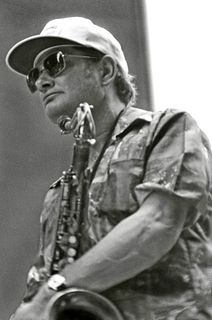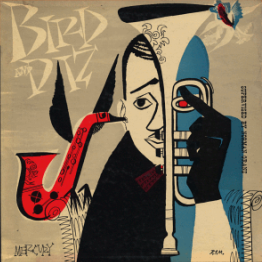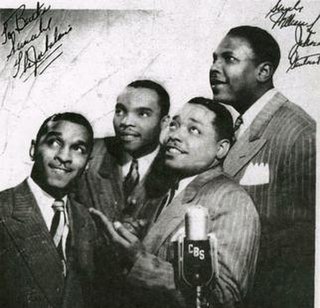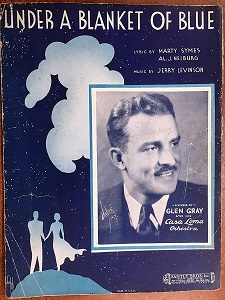Related Research Articles
The Penguins were an American doo-wop group of the 1950s and early 1960s, best remembered for their only Top 40 hit, "Earth Angel", which was one of the first rhythm and blues hits to cross over to the pop charts. The song peaked at No. 8 on the Billboard Hot 100 chart, but had a three-week run at No. 1 on the R&B chart, later used in the Back to the Future movies. The group's tenor was Cleveland Duncan.

William Clarence Eckstine was an American jazz and pop singer and a bandleader during the swing era. He was noted for his rich, almost operatic bass-baritone voice. His recording of "I Apologize" was given the Grammy Hall of Fame Award in 1999. The New York Times described him as an "influential band leader" whose "suave bass-baritone" and "full-throated, sugary approach to popular songs inspired singers like Earl Coleman, Johnny Hartman, Joe Williams, Arthur Prysock and Lou Rawls."

John Haley "Zoot" Sims was an American jazz saxophonist, playing mainly tenor but also alto saxophone. He first gained attention in the "Four Brothers" sax section of Woody Herman's big band, afterward enjoying a long solo career, often in partnership with fellow saxmen Gerry Mulligan and Al Cohn.
The Weavers were an American folk music quartet based in the Greenwich Village area of New York City. They sang traditional folk songs from around the world, as well as blues, gospel music, children's songs, labor songs, and American ballads, and sold millions of records at the height of their popularity.
Discography is the study and cataloging of published sound recordings, often by specified artists or within identified music genres. The exact information included varies depending on the type and scope of the discography, but a discography entry for a specific recording will often list such details as the names of the artists involved, the time and place of the recording, the title of the piece performed, release dates, chart positions, and sales figures.

"Goodnight, Irene" or "Irene, Goodnight," is a 20th-century American folk standard, written in 3
4 time, first recorded by American blues musician Huddie 'Lead Belly' Ledbetter in 1933.
"You Call Everybody Darlin'" is a popular song. The words and music were by Sam Martin (né Samuel Matzkowitz; 1908–2002), Ben Trace, and his brother, Al Trace, who used the pseudonym, Clem Watts. The song was copyrighted and published in 1946.

Bird and Diz is a studio album by jazz saxophonist Charlie Parker and trumpeter Dizzy Gillespie. It was recorded primarily on June 6, 1950, in New York City. Two tracks featured on the original pressing, "Passport" and "Visa", were recorded by Parker, without Gillespie and with a different personnel than that of the other tracks, in March and May 1949. The album was originally issued in 1952 in 10" format as a collection of 78 rpm singles on the Verve subsidiary label Clef Records.
"It's Just a Matter of Time" is a popular song written by Brook Benton, Clyde Otis, and Belford Hendricks. The original recording by Benton topped the Billboard Hot R&B Sides chart in 1959 and peaked at No. 3 on the Hot 100 pop chart, the first in a string of hits for Benton that ran through 1970.

Clyde H. Lucas was an American big-band leader who was popular in the United States in the 1930s and 1940s. He was the leader of Clyde Lucas and His California Dons.

The Jubalaires were an American gospel group active during the 1940s and 1950s. The group initially went by the name the Royal Harmony Singers, as far back as 1936 and under that name reached #10 on the R&B charts on November 14, 1942, with "Praise the Lord and Pass the Ammunition", a song adapted from the speech of a naval chaplain in response to the attack on Pearl Harbor the previous year. They are also remembered for their rhythmic rhyming verses, which would later evolve into rapping.
Bel-Tone Recording Corporation was a small American independent record label founded in 1944 in Hollywood, California, that recorded and produced artists of the pop, race, and folk genres.
Oett M. Mallard, also known as Sax Mallard, was a Chicago-based jazz saxophonist and bandleader.
Charles Henderson Drayton was an American jazz bassist who performed and recorded from the late 1930s until his death with artists that include Louis Jordan, Benny Carter, Dizzy Gillespie, Pete Brown, Ben Webster, Joan Edwards, Timmie Rogers, Savannah Churchill, the Basin Street Boys, Barney Bigard, Billie Holiday, Coleman Hawkins, Woody Herman, Julia Lee, Jack Teagarden, Louis Armstrong, Fletcher Henderson, Russell Jacquet, Marion Abernathy, The Treniers, Billy Taylor, Helen Humes, and Teddy Bunn. In 1946, he played several times with artists at Jazz at the Philharmonic.

Robert Byrne was an American bandleader, trombonist, and music executive. His big band was well regarded, although it never achieved the level of popularity that he had hoped for. He flew aircraft in World War II, and later became a musical producer for television and albums credited to other artists.
The DeMarco Sisters were an American close harmony singing group of the big-band era who recorded popular music and performed in concerts and on the radio, television, and on film from the 1930s through the 1960s. They first achieved fame as weekly performers on The Fred Allen Show from 1946 to 1949, and were featured singers in the 1952 film Skirts Ahoy! with actress Esther Williams. The group was initially composed of five biological sisters. Music critics have compared their sound and style to that of The King Sisters. They made recordings for Majestic Records and Mercury Records among other labels.

Dick "Two Ton" Baker was an American singer and entertainer who was a prominent Chicago radio and television personality for three decades; the 1940s to the 1960s. He gained some national exposure in the United States through his recordings for Mercury Records and his Mutual Broadcasting System radio show.
Blue Gardenia is the title of a torch song composed by Lester Lee and Bob Russell, for the 1953 movie The Blue Gardenia in which a recording of the song serves as a crucial plot point. The song was recorded for The Blue Gardenia by Nat King Cole who also performs the song in the film as a lounge singer. Cole recorded "Blue Gardenia" in a 20 January 1953 session at the Capitol Records Recording Studio in Hollywood, featuring the Nelson Riddle orchestra. The track was issued as the B-side of Cole's number 16 hit, "Can't I".

"Under a Blanket of Blue" is an American popular song composed by Jerry Livingston, with lyrics by Marty Symes and Al J. Neiburg. It was published by Santly Bros., Inc. in 1933, one of four hits by the songwriting trio that year, along with "It's the Talk of the Town."
Jackie Jocko was a musician, singer, and songwriter from Buffalo, New York. His albums included: “Lover, Come Back to Me” (1952), “Jackie Jocko – Mr. Excitement – From Coast to Coast” (1961), and “Like Wow!” (1962). Following an active national music career, he returned to Buffalo in 1972, and was locally most well-known for the 20 years he played at E.B. Green’s Steakhouse. He was inducted into the Buffalo Music Hall of Fame in 1997.
References
- ↑ Whitburn, Joel (1986). Pop Memories 1890-1954 . Menomonee Falls, Wisconsin: Record Research, Inc. p. 21. ISBN 0-89820-083-0.
- ↑ Ruppli, Michel (1993). The Mercury Labels: The 1945-1956 era. ABC-CLIO. p. 195. ISBN 9780313290312.
- ↑ "Honor Roll of Hits". Billboard. August 26, 1950. Retrieved April 26, 2014.
- ↑ Ruppli, Michel (1993). The Mercury Labels: The 1945-1956 era. ABC-CLIO. p. 218. ISBN 9780313290312.
- ↑ Ruppli, Michel (1993). The Mercury Labels: The 1945-1956 era. ABC-CLIO. p. 237. ISBN 9780313290312.